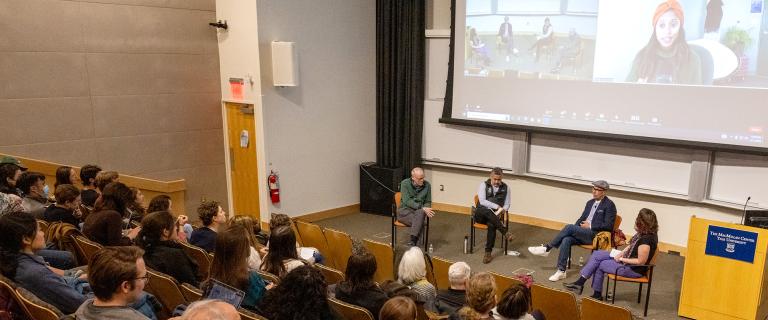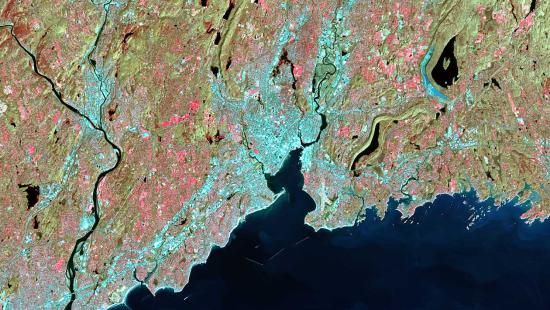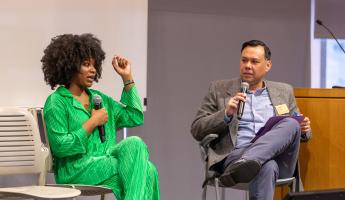How can you incorporate environmental justice into land conservation efforts when the challenges of entrenched hierarchal structures, economic inequity, and unequal access to nature still loom large? Add to this the impacts of climate change and you have a daunting mix of issues influencing our relationship with land.
During a panel discussion held at Yale’s Luce Hall March 31, which was co-sponsored by the Wyss Foundation, conservationists addressed the complexity of land ethics. Panelists included author Bill McKibben, founder of 350.org and Third Act, which organizes people over the age of 60 for climate action and justice; Sierra Club President Ramón Cruz; Yale School of the Environment alum Rae Wynn Grant ’10 MESc, a wildlife ecologist and research fellow at National Geographic; and YSE lecturer Pat Gonzales-Rogers, former director and current consultant for the Bears Ears Coalition. The discussion was moderated by Marlyse Duguid, Thomas J. Siccama Senior Lecturer in Field Ecology and Yale Forests director of research.
During the one-hour event, panelists covered a range of topics from the values that should be guiding conservation to balancing the needs of communities with the needs of nature to overcoming environmental injustice.
Grant, who narrates PBS’s Nature podcast “Going Wild,” said that she has had to rethink — and unlearn — scientific training that socialized her toward a white, Western-dominated perspective that didn’t embrace knowledge held by local and Indigenous communities. She noted that conservation and land management often reflect a desire for power and control and are not centered on ecosystems and species as part of community and family systems.
“One thing that has been very profound for me as a conservation scientist is really taking the time and making the dedication and commitment to truly unlearn a lot of the ways that my scientific training socialized me toward a white supremacist patriarchy, and that lens through which I should do conservation science,” she said. “If we as a society get rid of white supremacist patriarchy, the environment will heal.”
In supporting the environment, the public also must support scientists who are underrepresented in the field including people of color, immigrants, and members of the LGBTQ+ community, she added.
Cruz, who is the first Latino president of the Sierra Club, said that balancing the needs of Earth and nature can often be tied up in individual values rather than collective thinking.
“Unless we change that value of being a human-centric world and a human-centric society to something much bigger, unless we make that shift, we won’t be able to translate that value to conservation,” he said.
Cruz said the Inflation Reduction Act presents valuable opportunities to address past injustices. The act, which provides $369 billion for clean energy expansion in transportation, infrastructure, and manufacturing, conservation of forests and coastlines, curbing carbon emissions, and environmental justice, is the largest U.S. investment in climate action.
Newsletter
Biweekly, we highlight three news and research stories about the work we’re doing at Yale School of the Environment.
Gonzales-Rogers said an ethical approach to land management must include building relationships and trust with communities historically involved in environmental stewardship and should reflect “Aloha Aina,” which means love of land.
“We have to operate from love. If we operate from the default mechanism of fear, what we are really doing at that point is being risk managers,” he said.
In the age of the Anthropocene and climate change, McKibben said his concern is whether there will be any land left to manage and conserve.
“Everybody has to have a land ethic in some deep way because it has to be one of the things that drives the deep changes in behavior that we desperately need,” McKibben said. “It’s easy for us to imagine this is somebody else’s problem to deal with. But the world in which we find ourselves now means that everybody’s lives impinge completely on the ability of any of these landscapes, any of these places, any of these communities to survive."
The panel was co-sponsored by YSE Ucross High Plains Stewardship Initiative: GPSS; LEAP; the EMC, Policy, PE2, and Forestry Learning Communities; YELA; YALS; Yale Environmental Humanities; and the Fire, YTF and Westies Student Interest Groups.




